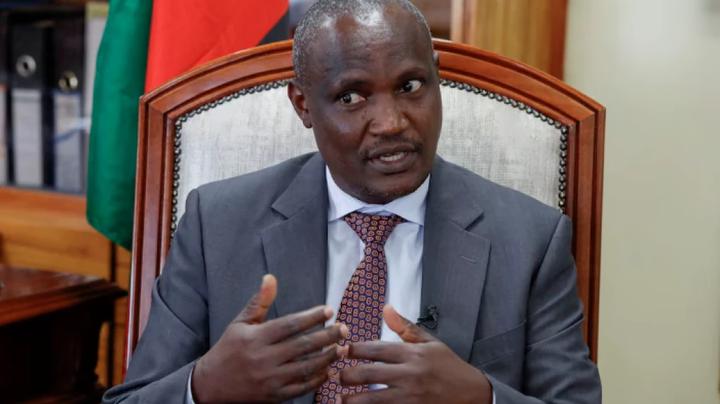Treasury Cabinet Secretary John Mbadi is appearing on Citizen TV tonight for a special program titled “Finance Bill 2025: The Budget Dialogue.”
The live broadcast from Daystar University features CS Mbadi alongside a panel of experts, including Allan Chacha, CEO of UCSPAK; Yusuf Haji, Chairman of the Cohesion Committee, National Assembly; and Linus Nthigai, Executive Director of the Inter-Religious Council of Kenya.
The program is set to provide a comprehensive analysis of the Finance Bill 2025 and the 2025/26 budgetary allocations, offering insights into Kenya’s financial strategy for the upcoming fiscal year.
The Finance Bill 2025, which was tabled before the National Assembly on April 30, has been positioned by the government as a citizen-friendly legislative measure.
According to CS Mbadi, the bill does not introduce any new taxes, a decision driven by the need to alleviate the high cost of living in Kenya.
“We have not introduced any tax measures which will add the burden on the taxpayer,” Mbadi stated in an earlier interview with Citizen TV.
The 2025/26 budget has so far been revised downward by Kes 23.972 billion, bringing it to Kes 4.24 trillion according to recent reports, with further adjustments expected.
This reduction reflects a cautious approach following public backlash against previous finance bills, notably the 2024 Finance Bill, which was withdrawn after youth-led protests.
Notable Proposals in Finance Bill 2025 and 2025/26 Budget
No new general taxes; stronger compliance
According to the government, the new Finance Bill introduces “no new taxes” – instead, it focuses on closing loopholes and broadening the tax base.
CS John Mbadi told the media, “We have not introduced any tax measures which will add the burden on the taxpayer”.
The Bill includes tougher measures to plug revenue leaks, such as stricter penalties for late filing and streamlined refund processes.
Reliefs for employees and pensioners
Significant reliefs are proposed for ordinary earners such as per diems for workers which will be tax-free up to KSh 10,000 (up from KSh 2,000).
The 1.5% Digital Service Tax on online earnings has been scrapped.
Crucially, all pension and gratuity payments will be fully exempt from tax, meaning retirees keep more of their savings.
Youth and digital economy
The budget boosts digital skills and ICT infrastructure for youth job creation. Last year’s budget earmarked KSh 16.3 billion for the digital and creative sector (digital hubs, ICT training and tech facilities).
However, the 2025/26 plan includes funding for more digital hubs and tech training centers to create online work opportunities. The government has even subsidized smart-phone assembly to improve access to internet jobs.
Higher spending on priority sectors
Essential services – notably agriculture, healthcare and education – receive bigger allocations. The Finance Bill protects funding for farm inputs and subsidies (food security) and for schools.
In health, for example, the Cabinet has approved the construction of two new level-6 referral hospitals in Kericho and Bungoma to advance Universal Health Coverage.
Overall, experts observe that the budget will reflect a philosophy of fiscal consolidation by tightening non-priority spending (e.g. cut travel budgets) but boost development and social-sector programs.
Cut in construction levies
The Bill dramatically reduces the Export & Investment Promotion Levy on many construction inputs. Products like semi-finished steel will see the levy slashed from 17.5% to 5%.
Withholding tax on public suppliers
The Finance Bill further proposes that payments to suppliers of goods to the government and county agencies attract withholding tax.
Any money paid to public entities (or proceeds from scrap sales) will be treated as income subject to WHT. This change extends last year’s move to automatically collect tax at source in public procurement, closing another compliance gap.
VAT and excise reforms
Several tax code changes will widen the base. The VAT registration threshold is raised from KSh 5 million to KSh 8 million , easing burdens on small traders.
Some previously exempt services (e.g. issuance of credit cards or mobile money services) have been brought under the 16% VAT rate.
On excise, the Bill imposes a new 20% levy on non-resident digital platform services (digital lending, e-commerce, etc.) and raises excise on money transfer services from 15% to 20%.
The 1.5% Digital Service Tax has been replaced by a more comprehensive 6% “Significant Economic Presence” tax on foreign digital firms.
Other changes. In addition, the Finance Bill streamlines tax administration (e.g. faster tax refunds) and updates various deductions (e.g. 100% first-year write-off for low-cost business tools).
